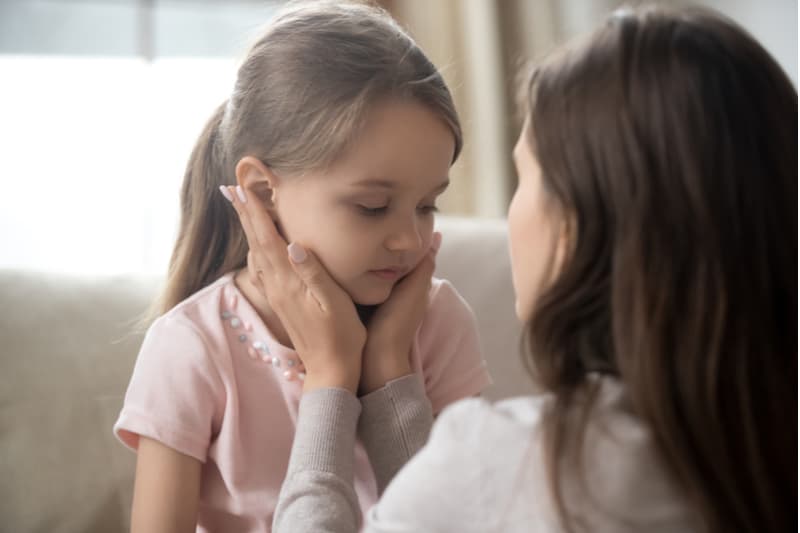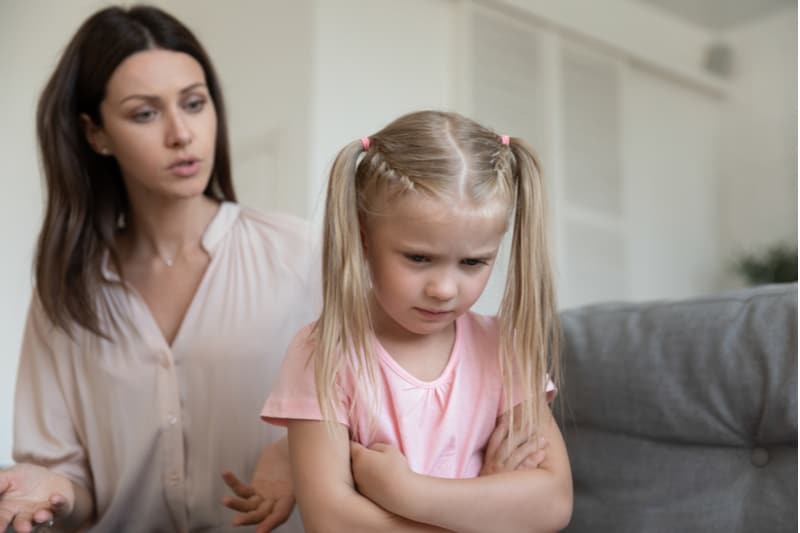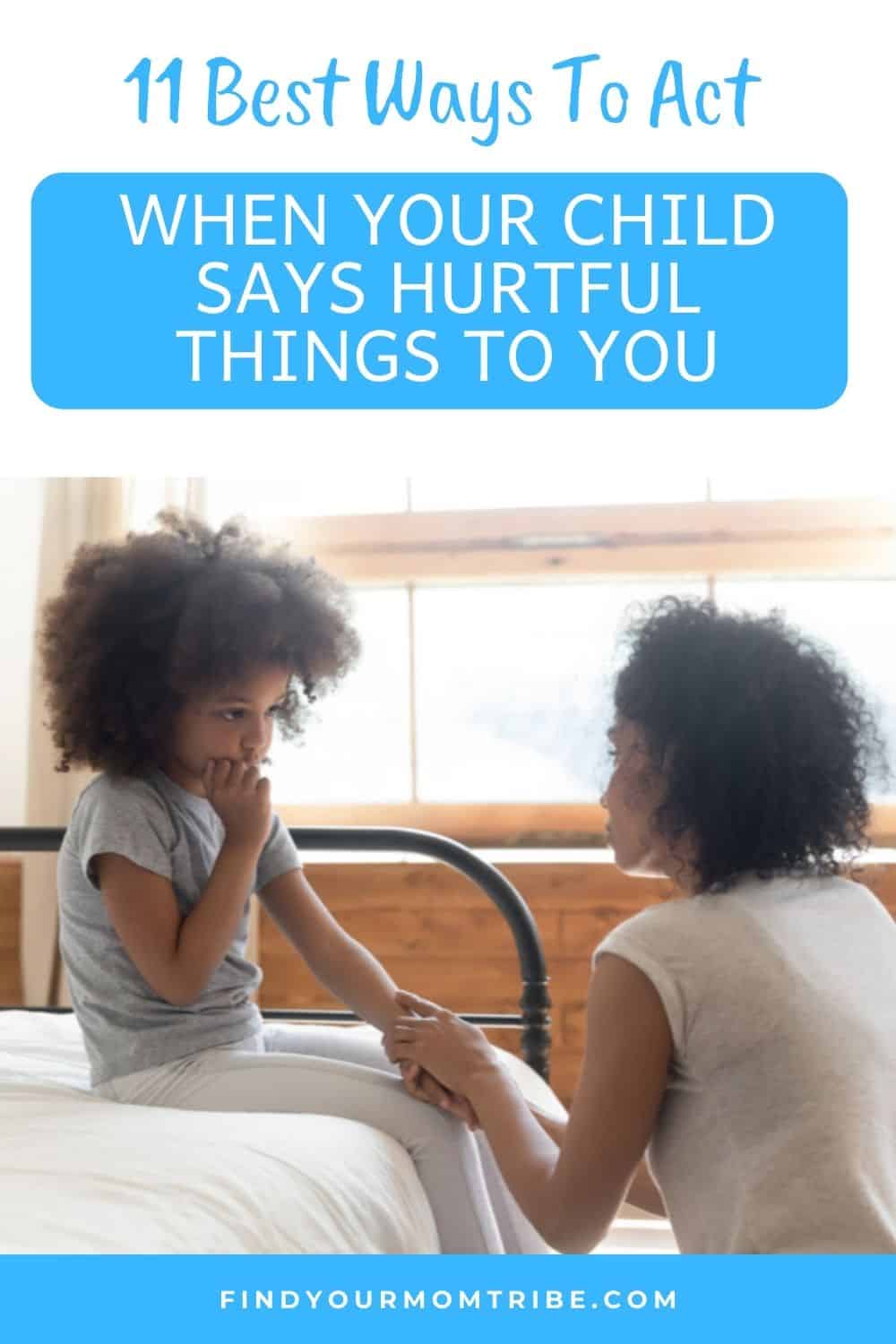When you’re a mom, you’re bound to have arguments with your child at some point, and some mean things might be said between the two of you.
So what should you do when your child says hurtful things to you?
The most important thing to do when your child says hurtful things to you is acknowledge your child’s feelings and analyze whether or not there’s more to what they’re saying, rather than it just being a spur of the moment thing.
It’s important to acknowledge their feelings and be tolerant of their actions as many hurtful words are spoken as a way to handle a sudden emotional outburst in the heat of the moment.
This is especially true with young children who don’t know how to handle a situation.
I’m referring to things like getting scolded or lectured, because the child might have done something that wasn’t okay or being punished, like grounded or getting a time out.
What might seem like regular discipline which helps punish tantrums, outbursts, and other forms of bad behavior, can end up being a really big deal for kids.
Young kids might see taking away their favorite toy as a trigger for these angry words, while teens might find cutting their time on the computer or enforcing a curfew is the spark to set them off.
Words might range from something simple like I hate you for younger kids simply lashing out, to your teenage kids going as far as saying I wish you were dead, which might lead to a lot more hurt feelings.
You should know most of these are made in the heat of the moment, so don’t jump the gun and overreact.
It can sometimes be hard to try and find something which might undermine someone in a position of authority over them, the parent in this case. So they fall back on words they know can leave an impact, but they’re unaware of just how much.
That’s why I’m here to give you some parenting tips on how to handle the times when your child says hurtful things to you.
What To Do When Your Child Says Hurtful Things To You
1. Acknowledge the child’s feelings

Dealing with an argument between a parent and their child is likely to be as much of a first time for you as it’s going to be for them. You’re the adult, so you’re not allowed to react in the same manner they might.
You have to be the wiser between the two of you and exercise a little bit of patience with this specific scenario. Your kids likely can’t properly express the way they’re feeling right now, which is what made them resort to such abrasive language in the first place.
Try and learn exactly why your children feel hurt or betrayed, what actions of yours might have caused this to happen and whether or not it was justified.
Don’t do this alone, though. Do it alongside your kids.
A good way of starting this process is to find the right time, where you can talk to them one on one in case this argument arose in a public place.
This way you won’t have to endure onlookers watching your family drama.
Once you do, the emotions may have even simmered down to the point where it won’t be like trying to walk through a minefield. What’s important is to approach it in a tone that’s not meant for lectures, but for compassion.
A good example is something like: “Hey… I know that I’ve clearly upset you in some way and that some words were exchanged.
I imagine you feel hurt or betrayed and I’d like to understand why so we can maybe come up with a compromise.”
It might not always work and you may need a few attempts, but simply showing that you care will go a long way.
2. Don’t mirror your child’s behavior
Another key rule in dealing with situations when your child says hurtful things about you is to never fight back by doing the same.
You’re meant to be a role model for them and trying to resolve conflicts with aggressive actions and words only aimed to hurt the other person, without contributing to the conversation at all, is just validating bad child behavior.
It’s what a bad parent does and is ultimately something you want to prevent yourself from doing, no matter how much restraint it takes.
Believe me, you’ll learn to stomach more things as a parent than you previously could have done.
You need to demonstrate to your child that a calm demeanor and a cool head will solve more arguments than violence ever will in the first place.
And don’t just do it when your kid’s around, because then you might get caught in your own lie and you’ll achieve the opposite effect.
Make sure to stand behind what you tell your kids with actions that mirror them in similar situations, and your integrity and honesty will be the reason your kids will continue looking up to you.
3. Don’t take the outbursts of your child personally

Your child’s insults might end up hitting on a personal level, a facet of yourself that you normally hold dear.
That comes with the territory, but whether they meant it or not, don’t take them personally.
The focus on the context shouldn’t really be about what was said about the way you dress, cook, or anything else, but rather on what caused your child to say something like that in the first place.
I get it, it can be hard hearing any form of harsh criticism, and it can really do a number on your self-esteem, regardless of whether it comes from a 4-year-old son or a 15-year-old daughter.
Emotions will well up inside you just as much as they might in your child, but you’ve had years of experience dealing with stuff like this, so try and temper it. If you’re having difficulties, just stop and take a deep breath or two before saying anything.
Let your thoughts simmer before you form a response, so it comes out as compassionate instead of hurtful.
4. Never use swear words
As mentioned before, parents are often the first role models children look up to, and your kids are no different.
That’s why it’s the duty of every good parent to set a good example for their children and help with healthy child development.
One of the worst things you can do is start using swear words in normal conversation around your kids or to settle an argument.
It rubs off on them really quickly, and once they pick up on it they’ll never let it go.
While swearing can be harmless, it’s simply rude and inappropriate more often than not and should be avoided whenever possible.
Sure, they’re more than likely to pick up on it when they hit their teenage years, or earlier depending on the type of environment they grow up in, but they’re a lot more likely to start using swears and inappropriate language if they hear you doing it too.
That’s why you should stick to language that’s more age-appropriate!
5. Leave arguments for later

While it might feel like you need to be right in every argument, that really isn’t always the case. Sure, always caving to your child’s whims might tip the scales in the so-called parent-child power struggle, but you don’t need to lecture them every step of the way.
Some arguments are best left for later, as are some lessons.
If your child didn’t see what they did wrong to spark the argument these hurtful words arose from, then chances are they more than likely won’t notice a few minutes into the argument either.
Give them space to let the tensions loosen and the iron cool before attempting another conversation.
It’ll allow them to process their thoughts and clear their head. Who knows, maybe they’ll even find a way to voice their opinion in a more constructive manner.
That’s when you should find the time to talk to them and see what brought this up in the first place.
I’ve already talked a bit about this in the part about acknowledging the child’s feelings, but all of these intertwine and are equally as important for learning how to properly resolve a situation when your child says hurtful things to you.
6. Treat your child as an equal
This one might seem silly, but it’s one of the best ways of teaching your child to stop relying on saying mean things as a defense mechanism in an argument.
Show concern for their side of the argument and be patient with them, give them time to vocalize their concerns and issues, and react to them as you would with another adult in civil conversation.
It needs to appear genuine too, meaning you’ll have to back it up with proper facial expressions and body language so it doesn’t seem like you’re just making fun of them.
This is usually a major problem that ends up being the cause of many disputes. Children feel as if they’re treated like, well, children and not taken seriously enough which, in turn, leads to tantrums, exchanges of hurtful words, etc.
It’ll often make them close up and feel less secure about their own opinion and their agency on decisions in their own life.
But when you treat them with respect it helps them be more open about their thoughts because you’ve shown them their opinion matters.
It’s something every child needs as it helps boost self-confidence, self-esteem, motivation, and plenty of other things that will help them develop character and see the benefit of a healthy discussion.
7. Knowing when to stand your ground

While it’s a good thing to let arguments simmer and give your child the benefit of the doubt, it’s not healthy to always let them win because they’re not always going to be right.
It’s important to still be the parent, and both a supportive guide and a disciplinarian.
The right balance usually comes from finding the right parenting style which fits you and your child, whether it’s Montessori parenting or a style you find on your own.
If you don’t, you’re more than likely to see your authority slipping as your kids start believing they can get away with anything.
As much as you have to worry about your kids’ self-confidence, there’s a difference between helping your kids have good self-esteem and letting them do whatever they want.
8. Admitting when you’re wrong
It’s healthy for your kids to see you’re able to admit when you’re wrong, without having the final say in every discussion.
It takes a big person to make the hard decision to punish their child, but it takes an even bigger one to admit they were wrong in the first place.
Sometimes our judgment doesn’t fit the crime, or maybe there was no crime to begin with and it was all a big misunderstanding.
While this might feel like a humbling experience for a parent, it’s also key in helping your kids understand they too might be wrong about certain things, and that they might not always be right.
If their role model shows flaws, then they too might see their own and acknowledge them a lot easier.
And you’ve got to show your kids your unconditional love so they can feel secure in your bond, even when you argue.
9. Teach your child how to express dissatisfaction differently

Resolving a situation that flares up when your child says hurtful things to you isn’t just about reaching a compromise, but paving the way to avoid the same things happening again in the future.
If they don’t know any other way of reacting to an argument, then all you’ve done is temporarily solve one problem only for another to pop up later down the line.
But, if you actually take the time after resolving one of your arguments to explain why resorting to hurtful words never amounts to anything good, as well as different ways of expressing dissatisfaction, you’ll reach a more positive conclusion.
You’ll also teach your child to analyze their own actions, which might end up avoiding the argument altogether if they end up realizing they were the ones in the wrong.
Sure, all of this is likely to take more than one session of explaining things, but you’ll get there in time.
10. Acknowledge your child’s progress
One thing every child needs is a little bit of positive reinforcement, confirmation they’re doing something good so they know they’re on the right path.
After teaching them alternative methods of approaching arguments, it’s important to acknowledge them when they use them.
Praise them when they don’t use bad words in an argument, when they choose to accept they’ve done something wrong, or when they decide not to further engage in an argument with someone who’s very upset.
It’ll help promote the healthier mental development of your child and their overall character.
RELATED: The 9 Best Tips On Praising Children Without Spoiling Them
11. Analyze your own approach

As great as it might be to teach our children how to behave and respond to certain situations, it won’t do them any good if our own approach is flawed.
Not everyone has had a perfect upbringing and nobody has all the right answers, especially when it comes to parenting.
If it seems like your child is more combative against your decisions than normal, the truth may be that the fault lies somewhere within your approach to resolving arguments.
Take some time after an argument to analyze how you’ve acted and the steps that might have led to your child behaving in such a manner.
When your child says hurtful things to you, it’s often a result of various factors, one of which might be you. So try and figure out whether your child might feel a bit too pressured and is lashing out for that reason.
Maybe they feel a bit too stressed, or maybe you or the other parent have been a bit too hard on them lately without realizing it.
Maybe they’ve had a string of really bad days or gotten sick. Anything is a possible trigger and it helps if you can eliminate as many as you possibly can.
Final Thoughts

There are many ways to handle incidents when your child says hurtful things, and all of them are almost equally important.
The goal is to slowly implement them into your parenting style, analyze your current approach, and modify it so that it balances discipline and compassion.
You want it structured in such a way that your kids still respect you, but that they love you without feeling like your love is conditional.
Parents who are loving and reasonable, yet tough when needed, are prime examples of this approach!
Above all, make sure your kids aren’t lashing out because you’re neglecting them in some way.
Many problems actually arise when kids feel like they’re not getting enough attention.
Another important thing to note in that regard is that, despite their age, kids will respect you more if you show some respect in return.
During your conversations, make sure to treat them as an equal. Give some value to their opinion and they’re likely to do the same in return.
Even if they don’t initially, you’ll see just how much smoother the conversation goes, and that way it may never get to the point where things escalate and bad words get thrown around.
I hope that these little parenting tips have managed to help you get a better read on the situation, and I’ve got my fingers crossed it makes you a happier family! Until next time, mammas! Happy parenting.
Like this post? Please share or pin it for later. You can also stay in the loop and follow us on Facebook, Instagram or Pinterest.

We love honesty! Find Your Mom Tribe is an Amazon Associate and we earn from qualifying purchases through affiliate links at no extra cost to you. Please see our full Amazon Affiliate disclosure for more information.

